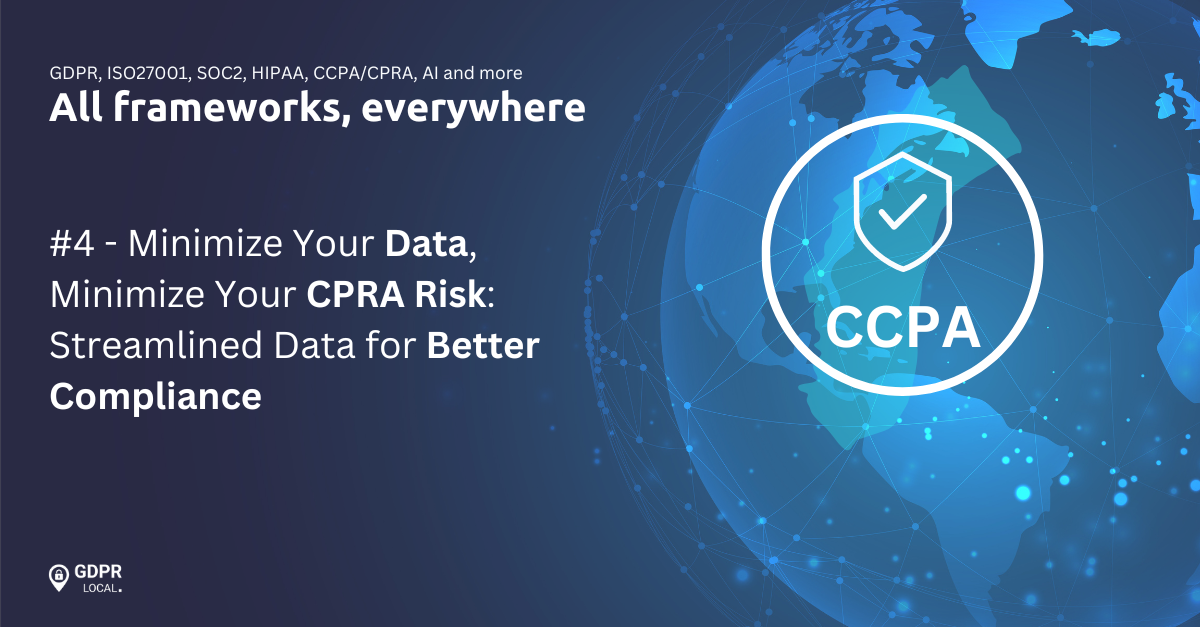
Minimize Your Data, Minimize Your CPRA Risk: Streamlined Data for Better Compliance
The California Consumer Privacy Act (CCPA) and its amendment, the California Privacy Rights Act (CPRA), grant California residents strong privacy rights, such as understanding what data businesses collect, having it deleted, and limiting its use. A core principle is data minimization—collecting and storing only the necessary personal information. The CPRA explicitly mandates data minimization, purpose limitation (using data only as disclosed), and storage limitation (retaining data only as long as necessary), making it a first in U.S. privacy laws.
What is Data Minimization?
Data minimization means collecting, processing, and storing only the personal information that is directly relevant and absolutely necessary to achieve your business purposes. It’s about focusing on what data you need rather than what data would be nice to have. Think of it as a quality-over-quantity approach. The “data minimization” requirement was introduced with the CPRA amendment to the CCPA and marks a milestone in U.S. privacy law by being the first to explicitly mandate data minimization for businesses. While primarily focused on notice and choice, the CPRA also introduces significant regulations on how businesses can use and retain collected personal information.
Data minimization relies heavily on the principles of purpose limitation and storage limitation. These principles establish clear boundaries for how and how long businesses can use personal information.
The CPRA’s “purpose limitation” rule is found in Section 1798.100 (a) (1) and (2). It sets two key requirements:
1. Businesses must clearly state the intended purposes for collecting each category of personal and sensitive personal information.
2. Businesses cannot use consumer data for purposes beyond those disclosed, unless:
– The new purpose is deemed compatible with the original collection purpose.
– The consumer is informed about the new purpose and provides consent.
While the CCPA and its regulations already necessitate additional consumer notice when businesses reuse collected personal information for significantly different purposes, the CPRA’s purpose limitation rule is more strict. It forces companies to justify their data practices upfront. This aligns with the established principles of fairness in data handling, also found in the GDPR, which many companies already try to observe. Still, excessive data collection is a widespread problem across industries. Companies that haven’t tackled GDPR compliance could find it particularly challenging to limit their collection practices to what’s reasonable and necessary.
Requirements for Data Minimization
The CPRA’s requirement to disclose the purpose of data collection upfront means businesses need to be more careful with those notices – they must allow for current uses and those they can reasonably anticipate in the near future. Finally, businesses will likely benefit from having internal guidelines and restrictions on how teams can use personal information, preventing secondary uses that go beyond the scope originally communicated to consumers.
The CPRA also mandates that businesses cannot retain consumer personal information for longer than is reasonably necessary for the disclosed purposes for which it was collected. This ties in closely with data minimization principles. The CPRA’s “storage limitation” rule (Section 1798.100 (a) (3)) requires businesses to:
1. Disclose to consumers their intended data retention period or the criteria used to determine it.
2. Only retain data as long as is reasonably necessary for its intended purpose (if the retention period isn’t explicitly stated).
3. Exercise good judgement and avoid overly long data retention timelines, regardless of disclosure type, to align with best practices.
The CPRA allows you to set a specific data retention period, but it’s important to be responsible. Don’t choose overly long timeframes without a good reason. “Reasonably necessary” is intentionally open to interpretation by the CPRA. To ensure compliance, carefully consider your actual business needs when storing data, and be prepared to justify the timeframe you choose.
Why is Data Minimization Important?

How to Implement Data Minimization in Your Business
Data Mapping
Conduct a comprehensive audit of the personal information you collect and its sources. Categorize this data against your stated business purposes.
Define Necessary Data
Carefully analyze which data types are truly necessary for each business purpose. Discard categories of data that do not serve a clear and justified need.
Implement Retention Schedules
Establish retention periods for each type of personal information based on the reason it was collected. Ensure these periods align with legal and business requirements.
Secure Data Deletion
Have secure and reliable processes for deleting consumer data upon request and in accordance with your retention policies.
Review and Update
Make data minimization and retention an ongoing practice. Regularly revisit your processes as technologies and business purposes evolve.
Contact us today for a consultation – we’ll work with you to develop a data minimization plan that strengthens your CCPA/CPRA compliance, reduces risks, and builds consumer trust, ensuring you have the support and guidance you need throughout the process.